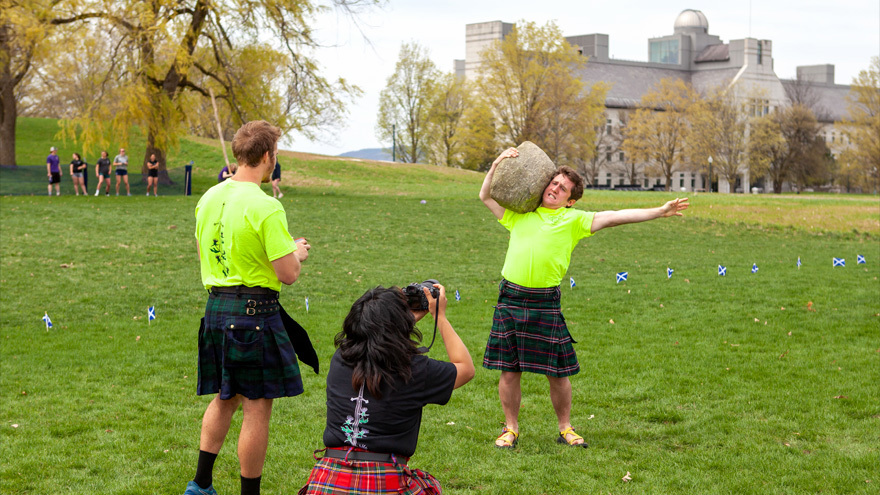On a sunny Saturday afternoon this past April, it wasn’t unusual for there to be music wafting through the air near Battell Beach and bare-legged students playing games with their friends.
The bagpipes, however, as well as the stones, cabers, and sandbags …? Those were unusual—as were the kilts.
The music, the activities, and the tartans all belonged to the student-run Middland Games, a first-ever Middlebury riff on the traditional Scottish Highland Games, which have been celebrated in Scotland for hundreds of years. Traditionally, the games include feats of strength and stamina as well as music, and the Middland Games featured both, plus a food truck that dished up traditional Scottish fare ranging from Scotch salmon stew to a “haggis sausage roll” that veered from the classic dish by not featuring sheep’s stomach or oats in its ingredients.
Sam Pelletier ’23, of Ellsworth, Maine, feels a strong affinity to his Scottish heritage (his mother’s family is part Scottish). He’s been learning to play the bagpipes and has amassed a small collection of kilts that he wears regularly. This affinity for kilts, in fact, led several of the event organizers to approach him in the gym and ask if he’d like to join them in creating the event.
He agreed. “Putting the games together was like a crash course in friendship,” Pelletier said. The cofounders, seniors Noel Anderson, Cole Helgaas, Mary Whisnant, Calvin Dupree, Willie Thacker, Ran Brown, and Pelletier, devised the program of events, which included two men’s and two women’s weight classes. Participants competed in stone to shoulder, Braemar stone throw, weight over bar, and the most iconic Highland Game event, the caber toss, where an athlete attempts to throw a 16-foot log end over end. They also organized live music, which included Department of Music affiliate Timothy Cummings on Highland pipes, as well as professional fiddle players and a guitarist.
The students also crafted the physical objects for the competition, including building the goal for the weight over bar (an event where competitors throw a heavy sandbag over a bar that increases in height with every turn) and hauling storm-downed trees from the surrounding woods to campus and cutting them into proper-sized cabers. For the stone to shoulder, where contestants lift a large rock to one shoulder and then hold the opposite arm away from the body, Pelletier and his friends pulled heavy rocks from Middlebury Gorge, including a 180-pound stone that was featured in the men’s heavyweight class. (No word on who got to take the stones back.)
All participants were required to attend at least one training prior to the competition, and despite the size of the objects being lifted and tossed, no one was hurt. Participants had the option to order a kilt to wear during the games, but the traditional Scottish garb wasn’t a requirement—plenty of students were tossing cabers, lifting stones, and hefting sandbags while wearing T-shirts and shorts.
With all of the organizers graduating, the future of the Middland Games will depend on the enthusiasm of others, said Pelletier. “This took commitment, time, passion, energy. … It meant a lot to me. I went full throttle from the moment I was invited on board,” he said. “These are incredibly energetic people who made this happen. But I heard from spectators and participants that they can’t wait to do it again.”
As for Pelletier, he was planning a postgraduation trip—to Scotland, where he and a companion were going to hike the legendary West Highland Way.
He’ll be wearing a kilt, he says.

Leave a Reply